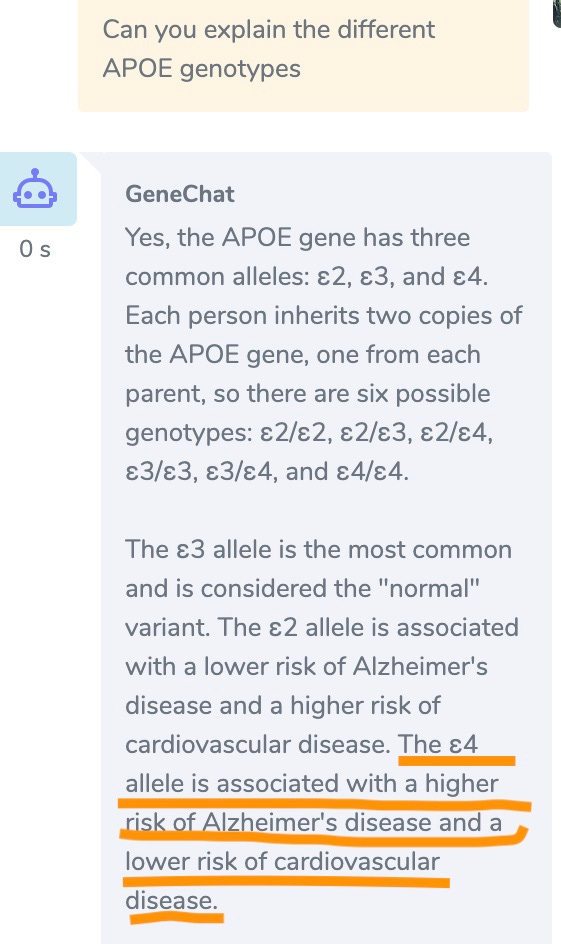Hi there,
New AI tools are coming out every day, and I wanted to share what I've learned.
I mentioned a few months ago that it's difficult to tell whether AI generated content is accurate and true. The AI content sounds so factual, stating information without hedging. Without background knowledge, I would have no idea whether it was right or wrong.
Here's two examples I've come across this week of why AI generated content on genetics is, well, quite frankly dangerous:
First example:
I'm writing an article on maca root (coming next week) and decided to try the latest chatGPT 4 version to see what it could do. It generates great sounding content and can even include references. The referenced sources were ones that I had already read on maca root - legitimate, quality papers. I was totally impressed... until I realized that the references didn't match up to the information paragraphs. The AI can generate background information and identify which references are likely to be used based on the websites it has scraped. However, it wasn't actually using information from the referenced studies in writing the paragraphs. Additionally, it made up several genetic connections that are not at all backed by the research papers. They actually seemed like logical genes to interact with hormones and maca. However, there is no research on those interactions.
The second example is from a genetics 'report' company that has revamped their site and is now advertising "genetic data analysis now with AI". (I'm not going to name names here.)
Included on their new site is an AI chat bot they named "GeneChat". I tried it out, using their recommended question on the different APOE genotypes.
Here's the answer I received:
At first glance, it sounds good! But... When you read the answer carefully, it isn't exactly right.
The first part is correct - the APOE E4 allele is linked to a higher risk of Alzheimer's disease. However, the cardiovascular disease risk is backwards. The APOE E4 allele is solidly linked to a higher risk of cardiovascular disease. While there are nuanced lifestyle variables to consider, in general, it has been known for decades that the APOE E4 allele is linked to increased relative risk of cardiovascular diseases.[ref][ref][ref][ref][ref][ref]
How can you know if what you are reading is correct? It is getting harder and harder for me to know for sure. I now check the references in most articles and also read related studies. If there aren't references listed in an article, then I'm generally skeptical of what I read.
Please don't take this to mean that the information on Genetic Lifehacks is perfect. Mistakes happen. I get about one email a month from someone who questions the accuracy of what I've written based on the reference that I've linked to in the paragraph. Sometimes what I've written is correct and they are misunderstanding; sometimes the reader is correct and I've made an error in the article. Either way, I am grateful for those who are checking my references and taking the time to email if there is confusion.
Bing and Google are rolling out AI search answers, and Word is now going to incorporate the AI writing assistant.
I'm seriously concerned that AI answers will simply be accepted as fact. The adoption of AI answers on health websites, search engines, blog content generators, and embedded into Word documents means that incorrect scientific information can and will be propagated everywhere.
Gratefully yours,
~ Debbie
Updated article:
ACTN3 Gene: Deficiency and Muscle Type
Key takeaways:
~ The ACTN3 gene encodes fast-twitch muscle fiber, but about 20% of the population has a non-functioning gene.
~ Non-functioning ACTN3 can affect athletic performance in certain types of sports.
~ ACTN3 type also impacts the ability to adapt to cold and muscle mass in aging.
What I've been reading:
1. Vitamin D supplementation and incident dementia: Effects of sex, APOE, and baseline cognitive status (Alzheimer's Association journal)
Vitamin D has popped up in a lot of studies lately, and there is little doubt that vitamin D levels are important in overall health. The question, though, is whether vitamin D supplements prevent any diseases of aging, and at what level.
This study looked at 12,000+ older people (avg. age 71) in regards to 10-year dementia free survival. The researchers compared people who had been taking vitamin D supplements at baseline compared to no vitamin D supplementation.
The research showed that Vitamin D supplementation decreased overall dementia risk by 40%, after adjusting for age, sex, education, race, depression, and APOE status. For people without the APOE E4 allele, vitamin D supplementation showed a 47% decrease in dementia risk. People with the APOE E4 allele are at a much higher risk of dementia, but vitamin D supplementation brought that risk down to almost normal.
Not a flashy headline, but this study brings up an interesting link between hormones, gut bacteria, and depression. The study looked at both lab animals and patients with depression. Testosterone is one hormone that is linked to depression symptoms. In the intestines, testosterone is recycled back into circulation. The study showed that certain bacterial strains produced the enzyme that degrades testosterone, which meant that less testosterone was reabsorbed. The decrease in overall testosterone due to less reabsorption was theorized to increase the risk of depression. The researchers tested a group of 100+ patients with depression and found that the testosterone-degrading enzyme was much more likely to be produced by the gut bacteria of the depressed patients.
3. SARS-CoV-2 Spike protein induces TLR4-mediated long-term cognitive dysfunction recapitulating post-COVID-19 syndrome in mice
Brain fog is common in long Covid and in people with Covid mRNA reactions. In this new study, researchers infused the spike protein into the central nervous system of mice. They found that the spike protein in the brain specifically caused memory dysfunction, which is seen in long Covid. Moreover, they determined that a central player in the neuroinflammation was the TLR4 gene. Interestingly, the researchers took it one step further and found that people with long Covid brain fog were more likely to carry a certain TLR4 genotype (rs10759931, GG genotype).
4. Adolescent exposure to low-dose Δ9-tetrahydrocannabinol (THC) depletes the ovarian reserve in female mice (Toxicological Sciences)
A new mouse study shows that cannabis use before adulthood depleted ovarian reserves in females. The ovarian primordial follicle numbers decreased by 50%, which raises a lot of questions on whether this is also relevant for humans.
Monthly Giveaway! Enter to win a free annual membership! (Go ahead and enter, even if you're already a member! If you win, I'll add the free year to your current membership.)





Debbie
Luv your work.
Comment on the apoE4 gene in case it intrigues you.
I don’t think any gene survived because it increases a bad outcome. I think we agree it would be the opposite. I think the issue in research that many don’t think about is that our genes are a mismatch to our modern environment.
The E4 gene was probably helpful in the past. I believe it is more a problem today for those who live an inflammatory lifestyle especially as it relates to a high processed food high carbohydrate high Omega 6 fat diet.
Cholesterol is not evil no matter what the establishment believes. So producing more is a factor of what our body needs to deal with our daily environment.
Thoroughly enjoy your work!